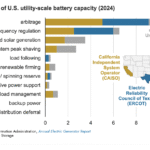The Future of Energy: Trends and Innovations
The energy industry is undergoing a significant transformation, driven by technological advancements, shifting consumer demand, and growing concerns about climate change. As the world transitions towards a more sustainable and renewable energy mix, companies are investing heavily in innovative solutions to reduce their carbon footprint. With the global energy demand expected to increase by 30% by 2040, the industry is poised for a radical overhaul.
Renewable Energy Sources: A New Era
The integration of renewable energy sources, such as solar and wind power, is revolutionizing the way we generate and consume energy. In 2020, renewables accounted for 26% of global electricity generation, up from 21% in 2015. This trend is expected to continue, with the International Energy Agency (IEA) predicting that renewables will reach 60% of global electricity generation by 2050. The cost of renewable energy technologies has decreased dramatically, making them more competitive with fossil fuels.
Solar Energy: A Key Player
Solar energy is emerging as a leading source of renewable energy, with solar panel prices dropping by over 70% in the last decade. This has led to a surge in solar energy adoption, with global solar installations reaching 720 GW in 2020. The use of solar energy is not only reducing greenhouse gas emissions but also creating new job opportunities and stimulating local economies.
Energy Storage: The Next Frontier
The growth of renewable energy sources has created a new challenge: energy storage. As the amount of intermittent energy generated from solar and wind sources increases, the need for advanced energy storage solutions becomes more pressing. Battery storage technology has improved significantly, with the cost of lithium-ion batteries decreasing by over 80% in the last decade. This has led to a proliferation of energy storage projects, with global energy storage capacity expected to reach 24 GW by 2025.
Hydrogen Fuel Cells: A Promising Alternative
Hydrogen fuel cells are emerging as a promising alternative to traditional energy storage solutions. With the ability to store energy for extended periods, hydrogen fuel cells can provide a reliable and constant source of power. The use of hydrogen fuel cells is not only reducing greenhouse gas emissions but also improving energy efficiency and reducing waste.
The Role of Technology in Energy Transformation
Technology is playing a critical role in the energy transformation, enabling the integration of renewable energy sources, improving energy efficiency, and reducing costs. Advanced technologies, such as artificial intelligence and blockchain, are being used to optimize energy distribution, predict energy demand, and enable peer-to-peer energy trading. The use of smart grids and IoT devices is also improving energy management, reducing energy waste, and enhancing overall system resilience.
Grid Modernization: A Critical Component
Grid modernization is a critical component of the energy transformation, enabling the integration of renewable energy sources and improving energy efficiency. The use of advanced grid management systems, such as smart inverters and energy storage systems, is improving grid resilience, reducing energy losses, and enhancing overall system reliability. With the global grid modernization market expected to reach $300 billion by 2025, the industry is poised for significant growth and innovation.


.png?w=150&resize=150,150&ssl=1)




